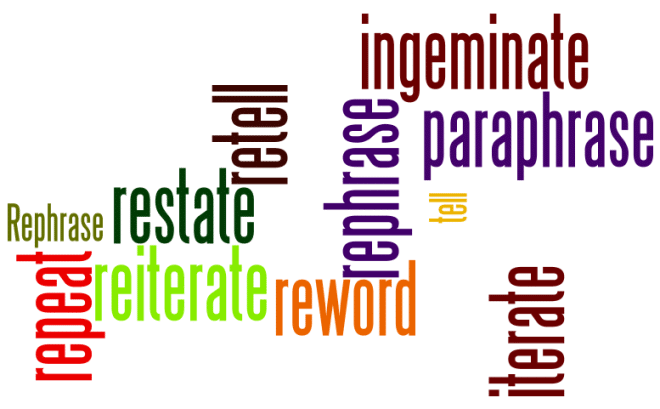Today – it can be said that at the request of readers who were even looking, they did not find an answer to their doubts here – we will discuss another pair of concepts not entirely properly distinguished by the students: paraphrase and periphasis. In this case, the reason for confusing these terms is primarily the similarity of the sounds.
Paraphrase
Paraphrase is a term in the field of literary theory and means: the free processing of a literary work, developing and modifying the content of the original; the preserved similarity of construction and style allows to recognize the paraphrased song.
Paraphrasing we also call the poetical translations of foreign-language poetry that are more loose than in a typical translation. I mean, for example, the poetic translations of the biblical Book of Psalms made by Jan Kochanowski and Czesław Miłosz, whose authors do not translate the source texts “word for word”, but approach this issue very freely.
Paraphrasing we also call, for example, many of the Songs of Jan Kochanowski, which are sometimes very distant from the originals, not even translations, but the original works that keep the meaning of the original.
Compare, for example, the final two stanzas of Song II.24 by Jan Kochanowski:
Moscow and Tatars will know about me,
And various English inhabitants of the world;
I am German and brave Spaniard, they will meet me,
Which deep stream of Tybe drink.
Let no grumbling at the funeral,
No complaint or accusation:
Candles and bells give up, and mar expensive,
And with a voice of mourning altars singing!
with the same fragment of the Poet’s Song – Horace’s bird:
I will be met by the Argonauts by Colchis,
The Gauls country , Dak, which suppresses fear,
and Gal from Rhone and from Ebro
Spaniard drawing water
I do not care about the funeral, the appearance of mourning,
futile songs, complaints and grievances,
Do not set fire to my pile
in a shout for vain glory.
This is certainly not a translation, because at first glance, it can be seen that the paraphrases of Kochanowski differ too much from the original to be considered a translation.
On the other hand, the preservation of the general sense of the original and some similarities in the structure allow to conclude that Kochanowski modeled on Horace. So it is not a translation, it is also not a completely independent text – it is simply a paraphrase.
It should be noticed in this place that sometimes it is difficult to say whether we are dealing with a poetic translation which, by its very nature, gives the author a certain, even substantial, freedom in the choice of linguistic means (a literary, philological translation of a poem would kill his poetic character) already with a paraphrase.
Periphrasis
Periphrasis, also called discussion include: the replacement of a word by a group of words which are descriptive or metaphorical equivalent of its meaning.
Speaking in a more understandable language, we could define periphery as saying something indirectly, but in a longer way.
Periphrasis character (because this is the adjective from the word periphse) also has many euphemisms, or expressions aimed at avoiding drastic or vulgar content. For example, the phrase “I will kick you where your back loses its noble name” or the saying of Winston Churchill, which instead of saying that someone is “a liar”, used to say that “he is economical in telling the truth”.
Originally, the periphasis was a stylistic measure aimed at eliminating the vocabulary used in everyday life from poetry. Over time, it has also entered other areas of the language, and many of them have come into common use.



 Worst
Worst Bad
Bad Good
Good Nice
Nice Amazing
Amazing









 Pricing
Pricing







